Feeling overwhelmed by the pressure to be "eco-friendly"? You want to make a difference, but the endless options and confusing labels make it hard to know where to start. You end up buying products that might not even be truly sustainable, leaving you frustrated and feeling like your efforts don’t matter. The key is to focus on simple, high-impact swaps first.
The top sustainable products for everyday use are items that directly replace single-use plastics and reduce chemical waste in our daily routines. This includes products like certified compostable trash bags, reusable silicone food bags, bamboo toothbrushes, and solid shampoo bars. These simple swaps are easy to adopt, effective in their function, and significantly cut down on landfill waste and pollution, making a tangible environmental impact every single day.
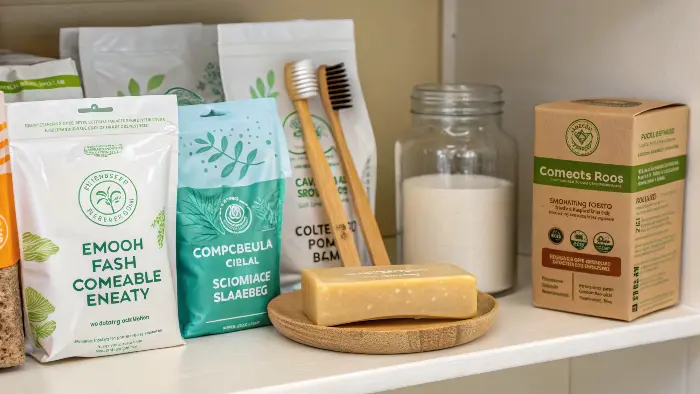
This initial list is a fantastic starting point, but it’s really just the beginning of the journey. To truly understand how to build a sustainable lifestyle, we need to look closer at the different areas of our lives where small changes can make a big difference. Let’s dig into the specifics and explore how these choices add up to create a massive positive impact.
What are eco-friendly things for everyday life?
You’re trying to make your daily life greener, but every corner of your home, from the kitchen to the bathroom, presents a new set of complicated choices. It can feel like you need a complete and immediate overhaul, which is both expensive and daunting. The secret isn’t to change everything at once, but to start with simple, smart swaps.
Eco-friendly things for everyday life are simply durable, reusable, or biodegradable alternatives to common disposable items. In the kitchen, this means reusable coffee cups and cloth napkins. In the bathroom, it’s a bamboo toothbrush or a solid soap bar that eliminates plastic bottle waste. These items are designed to reduce your daily environmental footprint, cut down on trash, and often save you money over time without sacrificing convenience.
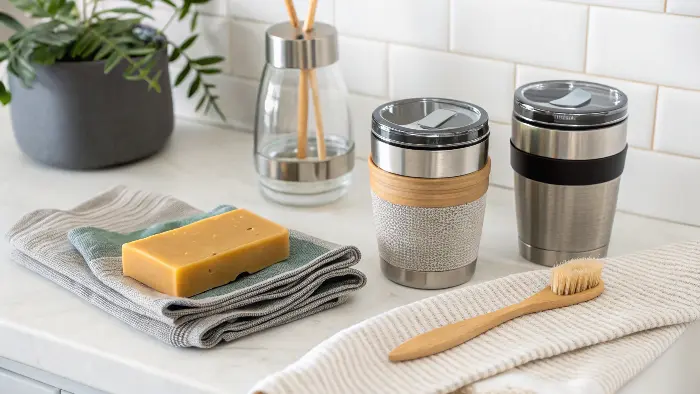
When I first started helping businesses source sustainable products, I noticed a common pattern. People always tried to tackle the biggest, most complex problems first. But the most successful transitions I’ve seen, both for companies and individuals, start with the small, daily-use items. The focus shifts from a "disposable" mindset to a "durable" one. Think about the kitchen sink. For years, I used those yellow and green plastic sponges without a second thought. I learned they are made from plastic and just sit in a landfill forever after I toss them.
A simple swap is to a coconut fiber brush or a loofah sponge. Here at Ecosourcecn, one of our most popular items for B2B clients is the humble coconut fiber dish brush. It’s made from a natural byproduct, works wonderfully, and is fully biodegradable. This single change eliminates a constant stream of plastic waste. We can apply this logic across the home.
Daily Swaps for a Greener Home
| Conventional Item | Sustainable Alternative | Key Environmental Benefit |
|---|---|---|
| Plastic Sponge | Coconut Fiber Brush or Loofah | Fully biodegradable, avoids microplastics. |
| Paper Towels | Reusable Cloth Towels | Reduces deforestation and landfill waste. |
| Plastic Food Wrap | Beeswax Wraps or Silicone Lids | Reusable, reduces single-use plastic. |
| Liquid Soap Dispenser | Bar Soap or Refillable Glass Dispenser | Drastically cuts down on plastic packaging. |
These small changes have a ripple effect, making sustainability a natural part of your routine rather than a chore.
What is an example of a sustainable product?
The word "sustainable" gets thrown around so much it can lose its meaning. It’s easy to get lost in vague claims and greenwashing. You might buy a product believing you’re making a good choice, only to find out it isn’t much better than the conventional alternative. Let’s cut through the noise and look at one perfect example to understand what makes a product truly sustainable.
A prime example of a truly sustainable product is the certified compostable trash bag. Unlike traditional plastic bags that last for centuries in a landfill, these are made from plant-based materials like PLA and cornstarch. They are engineered to break down completely into water, CO2, and nutrient-rich compost in an industrial composting facility. This transforms waste management from a one-way trip to the landfill into a circular system that helps regenerate the soil.
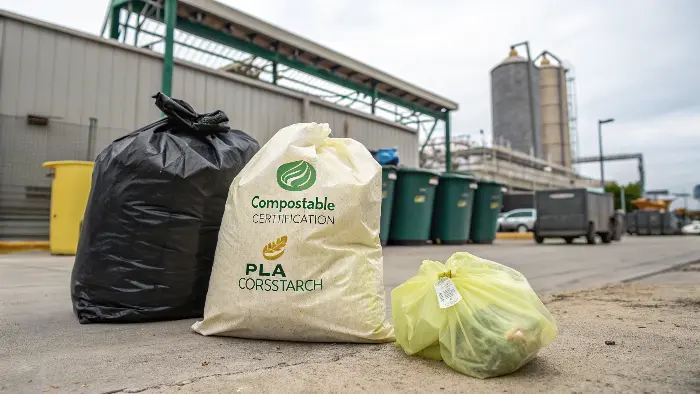
When I work with clients like Jacky, a packaging specialist in Canada, the conversation often starts with compostable bags. They are a gateway product for businesses looking to make a serious commitment to sustainability. But it’s crucial to understand the details. There’s a huge difference between something labeled "biodegradable" and something certified "compostable." "Biodegradable" is a vague term with no time limit—a plastic bottle will biodegrade over 400 years. "Compostable," on the other hand, means the product must meet strict scientific standards.
Beyond the Bag: Certification Matters
For a product to be truly compostable, it must be certified. In my line of work, these certifications are non-negotiable.
- ASTM D6400: This is the standard in North America. It proves a product will break down safely in a municipal or industrial composting facility.
- EN 13432: This is the European equivalent, with similarly strict requirements for disintegration, biodegradation, and eco-toxicity.
These certifications guarantee that the product is made from appropriate materials, like cornstarch-derived Polylactic Acid (PLA), a renewable resource. They also ensure the final compost is free of harmful residues and safe to use for growing new plants. This single product choice doesn’t just replace plastic; it enables a larger, circular system of organic waste recycling, turning garbage into a valuable resource. It’s a perfect illustration of a product designed for its end-of-life.
What are some examples of sustainable practices in daily life?
After buying a few eco-friendly products, you might wonder if you’re doing enough. Is sustainability just about what you purchase? Focusing only on buying things can feel counterintuitive and, frankly, expensive. It can make you feel like you are just consuming in a different way. The truth is, the most impactful sustainable changes are often free practices, not products.
Sustainable practices are the daily habits and choices that reduce consumption and waste at their source. Examples include meal planning to prevent food waste, walking or biking for short trips, and adopting a "buy less, but better" philosophy. Other key practices involve repairing items instead of replacing them, correctly sorting waste for recycling and composting, and mindfully conserving water and electricity at home. These actions create a much deeper sustainable impact.
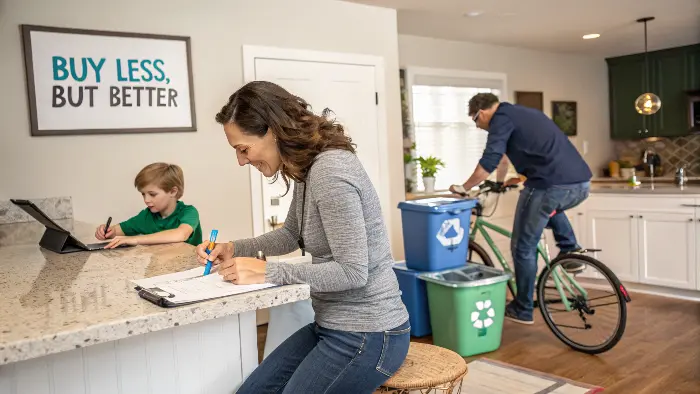
While my company, Ecosourcecn, provides sustainable products to replace necessary disposables, I always tell my partners that the most sustainable product is the one you never had to buy. True sustainability is built on mindful habits, not just green consumerism. A great framework for this is the "5 R’s."
The 5 R’s in Action: A Practical Guide
- Refuse: This is the first and most powerful step. Simply say "no" to things you don’t need. Refuse plastic straws at a restaurant, say no to a free plastic pen at a conference, and opt-out of junk mail.
- Reduce: Be conscious of what you use. This means reducing food waste by planning your meals, taking shorter showers to conserve water, and turning off lights when you leave a room. It’s about consuming less overall.
- Reuse: Before you recycle or toss something, think if it can be used again. Glass jars from pasta sauce are perfect for storing leftovers. An old t-shirt can become a cleaning rag.
- Repair: We live in a throwaway culture. Fighting this by repairing things is a radical act of sustainability. Mending a hole in your jeans, fixing a wobbly chair, or learning to repair a simple electronic device extends its life and saves resources.
- Rot (Compost): For anything that’s left, compost what you can. Organic materials like food scraps don’t belong in a landfill, where they release methane. Composting turns them into nutrient-rich soil.
Integrating these practices creates a foundation for a truly sustainable life. The products we provide are there to fill the gaps for the items that are unavoidably single-use in nature.
What are eco-friendly products for a sustainable lifestyle?
You’ve tackled the kitchen and started building better habits, but what about the bathroom? The personal care routine is often a major source of waste, filled with plastic bottles, disposable items, and questionable chemical ingredients. You worry about what these products are doing to your body and what their packaging is doing to the planet. The good news is that this area offers some of the most satisfying and impactful swaps.
Eco-friendly products for a sustainable lifestyle often center on personal care swaps that eliminate plastic and harsh chemicals. Key examples are solid shampoo and conditioner bars, bamboo razors with recyclable blades, and reusable makeup remover pads. Add to this organic soaps, natural deodorants in paper tubes, and skincare products sold in glass or aluminum jars. These items support a healthier you and a healthier planet.
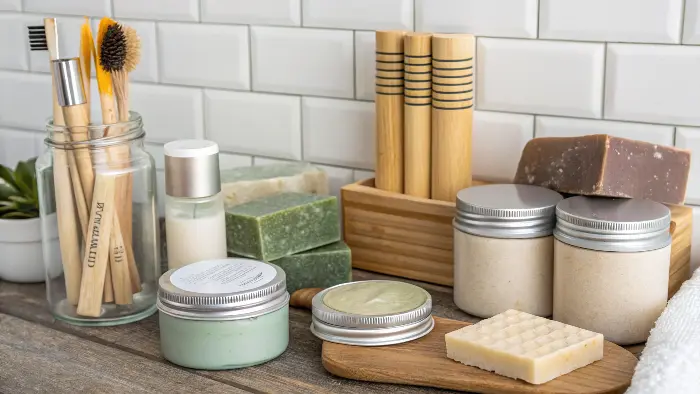
I remember looking at my own bathroom shelf a few years ago and being shocked by the sea of plastic. My journey with Ecosourcecn was partly born from a personal mission to solve that problem. It started with simple swaps that had a dual benefit: they were better for my health and drastically reduced my waste.
Let’s break down some of the best personal care swaps:
- Bamboo Razor: The handle is made from fast-growing, biodegradable bamboo, and the metal blades are widely recyclable. It’s a stylish and sustainable alternative to disposable plastic razors.
- Reusable Makeup Pads: A single person can use over 700 disposable cotton rounds a year. Switching to washable, reusable pads made from bamboo or cotton fleece saves an incredible amount of water and prevents waste.
- Solid Hair Care: Shampoo and conditioner bars are game-changers. They are concentrated, last a long time, and completely eliminate the plastic bottle. I source organic hair care bars for clients that are made with natural oils and no harsh sulfates.
- Organic Bar Soap: Many liquid body washes are essentially detergents in a plastic bottle. A simple, organic bar of soap is made with natural ingredients, often comes in paper packaging, and is fully biodegradable.
- Natural and Organic Skincare: Look for products in glass or aluminum packaging, which are infinitely recyclable. Prioritizing organic beauty products also means you’re avoiding potentially harmful synthetic chemicals and pesticides, which is better for your skin and for our waterways. Even natural perfumes using essential oils are a better choice than synthetic fragrances.
Each of these choices contributes to a cleaner personal routine and a cleaner planet.
Conclusion
Building a sustainable lifestyle isn’t about achieving perfection overnight. It’s a journey of making small, conscious choices every day. By swapping everyday items like trash bags and razors for greener alternatives and embracing practices that reduce consumption, you become part of a powerful global movement. These simple steps are accessible, incredibly impactful, and help create a healthier world for us all.


